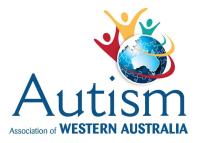Autism
- Autism (Autism Spectrum Disorder) is a lifelong developmental disability that is neurological in origin.
Previously, these disorders were categorised as:
- autistic disorder
- asperger syndrome
- pervasive developmental disorder not otherwise specified (PDD-NOS).
What are the signs and symptoms of autism?
Autism usually becomes apparent before a child is three years old. It is characterised by impaired social interaction and communication, as well as restricted interests and stereotyped behaviour. Autism impacts on a child’s development in a number of key areas, examples include:
- Some children with autism have greatly impaired ability to communicate or to understand spoken language. For those autistic children whose language does develop, their comprehension is often quite literal and they have great difficulty with abstract concepts or nuances. They can also appear to talk “at” people about a favourite topic, rather have an interactive conversation.
- Individuals with autism have difficulty establishing and maintaining relationships. They have difficulty reading the intentions, motivations or reactions of others. This impairs their ability to share interests and to engage with others in a conventional manner. They can appear disinterested when it is their impairment in skills to engage with others rather than a lack of desire on their part.
- Children with autism have a restricted and repetitive range of behaviour. Interests may be unusual in their intensity or focus. For example, the child may show a strong interest in parts of toys such as spinning the wheels of a toy car. Likewise, the child may line-up toys rather than play with them in an imaginative way.
- Most children with autism show a strong preference for routine and predictability. They may insist on activities that follow a particular order and resist any activity with which they are not familiar. They may also strongly resist change.
- Many people with autism show an unusual response to sensory stimuli: Some everyday noises can be experienced as overwhelming; and busy environments can be experienced as stressful. Also, some tastes, smells and textures can be experienced as intolerable.
What causes autism?
There is no known single cause of autism. Many causes of autism have been investigated and our understanding is still incomplete.
Research indicates that genetic factors predominate but it is unclear which genes may be responsible. It is generally agreed, however, that autism is likely to have multiple causes, including some pre-natal factors that result in the common symptoms of autism.
Autism also tends to occur more frequently than expected among individuals who have particular medical conditions including fragile X syndrome, tuberous sclerosis, congenital rubella syndrome and untreated phenylketonuria (PKU). It is more common in males than females.
How is autism first detected?
Parents usually notice signs in their child around the age of 2 years. The signs develop or become obvious gradually.
Some early signs in the child may include:
- Does not show interest in interacting with other children.
- Does not play 'pretend' games, imitate others, or use toys in creative ways.
- Does not seem to hear when others talk to them.
- Does not share interests or point out interests to others.
- Responds to a question by repeating it, rather than answering it.
- Reacts unusually to sounds, sights, smells or textures. May be especially sensitive to loud noises.
- Follows rigid routines and has difficulty adapting to change.
- Has an unusual attachment to objects such as keys, light switches, etc.
- Obsessively lines things up or arranges them in a certain order.
- Preoccupation with a narrow topic or interest.
- Repeats the same actions or movements over and over again, such as flapping hands, rocking, or twirling.
How is autism diagnosed?
Diagnosis is critically important in assisting the child (or older person) to receive the specialist support and intervention they need to maximise their skills; to participate to the fullest educationally; and to achieve a good quality of life as part of the community.
In Western Australia, diagnosis is usually undertaken by a Developmental Pediatrician in conjunction with a speech pathologist and psychologist. A parent with concerns about their child’s development should raise this with their General Practitioner who may consider referral to a Developmental Paediatrician.
How is autism treated?
While there is as yet no cure for autism, with appropriate intervention and support, children with autism can make significant progress so they can attend their local schools and utilise many of their strengths when it comes to choosing a job in later life.
The key factors in success are evidence-based support by professionals who know and understand autism. This will include working with the individual’s strengths to extend their skills while supporting their areas of difficulty.
Children and adults with autism will also require environments that are knowledgeable of their individual needs. This includes providing predictability and routine, supporting communication and understanding that difficult behaviour is a symptom of an underlying difficulty the person is experiencing that we need to identify, understand and address.
Good intervention never loses sight of the individuality of the person and the need we all have for relationships that are rewarding.
Where to get help
Last reviewed: 07-01-2019
Acknowledgements

This publication is provided for education and information purposes only. It is not a substitute for professional medical care. Information about a therapy, service, product or treatment does not imply endorsement and is not intended to replace advice from your healthcare professional. Readers should note that over time currency and completeness of the information may change. All users should seek advice from a qualified healthcare professional for a diagnosis and answers to their medical questions.